George Davie: Life and significance
An excerpt from the Introduction to the new edition of George Davie’s The Democratic Intellect, Edinburgh University Press, 2013.
George Davie’s The Democratic Intellect: Scotland and her Universities in the Nineteenth Century was first published in 1961. It pioneered the process of linking the intellectual traditions of the Scottish Enlightenment to those of today. Here and in its sequel, The Crisis of the Democratic Intellect: The Problem of Generalism and Specialisation in Twentieth-Century Scotland, George Davie demonstrated with skill, humour and historical grasp the need to reassess and to properly evaluate the generalist tradition of education in Scotland, a tradition in which philosophy played a central role. The value of Davie’s understanding of the philosophical underpinning of interdisciplinary education has been recognised both as a guide to the development of educational provision and as a significant commentary on the relationship between expert and community. Davie’s publications have become reference points for the discussion of cultural thought. However often those who use the term ‘democratic intellect’ have only a vague notion of what Davie actually wrote, and it is to be hoped that they will actually read this new edition.
The Democratic Intellect has a claim to be the most significant single volume written by a Scottish academic in the last fifty years. It sets out to defend not only the intellectual culture of Scotland but the whole notion of what an intellectual culture can be, by showing that all its parts should benefit from all its other parts. As human beings we require both poetry and mathematics. They are not in competition.
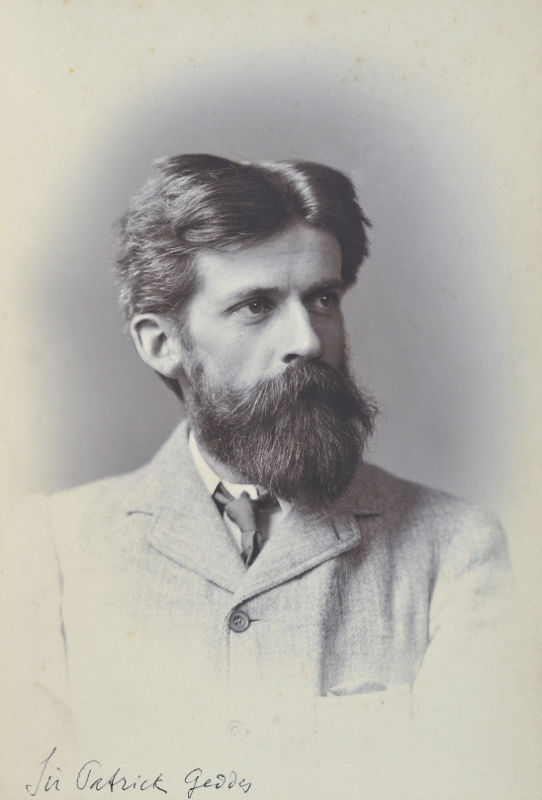 George Davie was born in Dundee in 1912. He was educated at the High School of Dundee and then at the University of Edinburgh. Dundee could not at that time provide him with an education in his chosen fields of classics and philosophy but it should be noted that during his childhood both Patrick Geddes and D’Arcy Thompson were professors at University College Dundee. Geddes’ thinking in particular is characterised by both an intellectual generalism and a regard for the visual, and it is these precise areas that were to emerge for Davie as the key aspects of the Scottish intellectual tradition which he went on to defend. In The Democratic Intellect Davie identifies Geddes as one of the last representatives of a Scottish philosophical approach to science teaching. It is interesting to note what Davie’s friend Hugh MacDiarmid said about Geddes: ‘He knew that watertight compartments are useful only to a sinking ship, and traversed all the boundaries of separate subjects.’ 1
George Davie was born in Dundee in 1912. He was educated at the High School of Dundee and then at the University of Edinburgh. Dundee could not at that time provide him with an education in his chosen fields of classics and philosophy but it should be noted that during his childhood both Patrick Geddes and D’Arcy Thompson were professors at University College Dundee. Geddes’ thinking in particular is characterised by both an intellectual generalism and a regard for the visual, and it is these precise areas that were to emerge for Davie as the key aspects of the Scottish intellectual tradition which he went on to defend. In The Democratic Intellect Davie identifies Geddes as one of the last representatives of a Scottish philosophical approach to science teaching. It is interesting to note what Davie’s friend Hugh MacDiarmid said about Geddes: ‘He knew that watertight compartments are useful only to a sinking ship, and traversed all the boundaries of separate subjects.’ 1
In the same book he devotes a chapter to The Democratic Intellect. The point is not to speculate about any direct influence of Geddes on Davie but rather to indicate that Davie grew up in the last years of a powerfully articulated intellectual tradition that had generalist thinking at its core. Davie’s significance for the history of ideas in Scotland is that he noticed that threatened aspect of his own culture and reflected on it when he became an academic. Nearby in St Andrews was the classicist and advocate of early Greek philosophy John Burnet. Burnet was another inspirational generalist thinker and Davie paraphrases him to give one of the clearest statements of his own vision: ‘the most important side of any department of knowledge is the side on which it comes into contact with every other department.’2
That notion that any aspect of knowledge, culture, or society benefits from the illumination of all other aspects is key to Davie’s thinking; for him the task of education was to facilitate that process. The social approach to knowledge that took for granted the role of the wider community in the process of establishing and maintaining bodies of knowledge also implied for Davie that within universities different disciplines should be juxtaposed for mutual illumination, and that a key role for the discipline of philosophy was to enable such juxtaposition to be understood.
While studying at the University of Edinburgh, Davie was one of a group of students that included Sorley MacLean and J. B. Caird. Slightly younger was Stuart Hood. It was Caird and Davie who introduced Sorley MacLean to the poetry of Hugh MacDiarmid, and it was Davie who introduced MacLean to MacDiarmid in the flesh in Rutherford’s bar in 1934.
Davie would have considered it only proper that these two poets were introduced to one another by a student of classics and philosophy. He was to be among the first readers of MacLean’s The Cuillin in typescript, describing it in a letter to the author as ‘a classic of our time’ an assessment that it is now so easy to echo.3 On graduating in 1938 he was appointed assistant at Edinburgh to the outstanding Kant scholar and translator, Norman Kemp Smith, who was a lifelong influence. In 1944 he married Elspeth Dryer, who, as Elspeth Davie was to became a highly respected writer, winning the Katherine Mansfield Prize in 1978. Elspeth was as acute a questioner of the nature of reality in her medium as was George in his. She had studied painting at Edinburgh College of Art before focusing on her writing and that again echoed George’s enduring interest in the visual. That interest emerges in a profound way in The Democratic Intellect through Davie’s consideration of the Scottish advocacy of the philosophical benefits of the study of geometry as against algebra. This was to a degree a defence of the high value placed on a visual approach to science and mathematics by Isaac Newton, at a time when the merits of such an approach were being overlooked south of the Border. A crucial example, for Davie, was Robert Simson’s edition of Euclid, published (complete with Simson’s philosophically informed notes) by Foulis of Glasgow in 1756. The implications of this ‘visual thinking’ aspect of The Democratic Intellect have still not been fully explored, but from a Scottish cultural point of view it finds its echoes everywhere from the engineering of Thomas Telford or James Watt to the photography of Hill and Adamson and the architecture of Charles Rennie Mackintosh. The Democratic Intellect is a book that practices what it preaches. It advocates an intellectual generalism and at the same time demonstrates just that on every page. Another example, again as yet not fully explored, is Davie’s exploration of the influence of Robert Burns as a philosophically informed thinker at the heart of the Scottish Enlightenment.
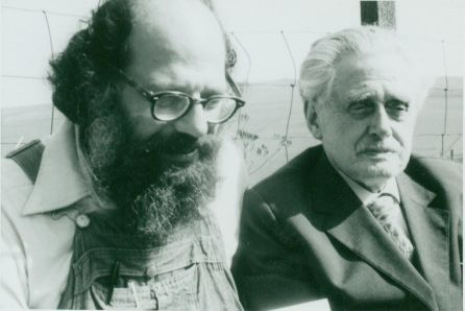
Allen Ginsberg with Hugh MacDiarmid, with whom Allen had read in London. Here in Scotland for MacDiarmid’s 81st birthday, August 1973
After the Second World War, George Davie was appointed to head the Department of Moral Philosophy at Queen’s University, Belfast. It was there that he conceived and wrote much of what was to become The Democratic Intellect. In 1953 his D. Litt was awarded by Edinburgh University. His thesis A Scotch Metaphysics – the Theory of Knowledge in the Scottish Universities 1730-1860 was accepted by Routledge but not published at the time due to the publisher requesting that Davie write a historical introduction to the book. This ‘introduction’ became The Democratic Intellect. In 1960 he returned to the Department of Philosophy at the University of Edinburgh, where he stayed for the rest of his career. The following year The Democratic Intellect was published. It attracted wide praise not least from a figure concerned with the failure of interdisciplinary understanding in English education, C. P. Snow, and its influence on the deliberations of the Robbins committee has been recognised. Nevertheless it appeared at a time of relentless specialisation in higher education, and its generalist message was by no means universally welcomed, even in his own university, and Davie was only too well aware of the challenge offered to then current thinking by his historical analysis. Today it is as relevant as ever, as we struggle with fragmented efforts at interdisciplinarity instead of adopting a philosophically informed approach such as Davie advocated.
In 1983 George Davie was elected a Fellow of the Royal Society of Edinburgh, one of the first philosophers to be so honoured in recent times. Davie’s continuing contribution at this time is evident from Derrida’s invitation to him to contribute to the conference, Victor Cousin, les ideologues et les ecossaise, which resulted in another notable paper, Victor Cousin and the Scottish Philosophers, first published in French in 1985 and published in English the next year in Edinburgh Review.4 In 1986, prompted by continuing enthusiasm for his work among his students, he published The Crisis of the Democratic Intellect: the Problem of Generalism and Specialisation in Twentieth-Century Scotland. As with The Democratic Intellect that book drew together philosophy, poetry, education and wider cultural issues. The Glasgow Herald reviewer commented ‘Davie may yet transform our ideas of twentieth-century Scotland’. The Times Higher Education Supplement suggested that ‘the chapter on MacDiarmid is the best account of the poet yet written’ while The New Statesman remarked that ‘if Davie had done nothing else in this fascinating book, his elucidation of the philosophical bearings of one of the greatest twentieth-century poets would have been sufficiently momentous’. The London Review of Books called it ‘a substantial achievement in the chronically underdeveloped area of post-Enlightenment Scottish studies’. The Times Literary Supplement struck an appropriately interdisciplinary note: ‘Davie displays on page after page the virtues of an education that encourages a free interplay between special knowledge and general understanding.’
Having made his mark again at an age of well over seventy, Davie continued to produce and to influence. In 1990, along with Noam Chomsky, he made a notable contribution to the Free University of Glasgow’s Self Determination and Power conference, which the writer James Kelman had helped to organise at the Pearce Institute in Govan. Introducing Davie’s essay collection published later that year, Kelman wrote ‘as well as offering an introduction to the intellectual struggles in Scotland in the 18th and 19th centuries, these essays by Davie offer an insight into some of the more crucial issues in modern times’. 5
In 2001, with the help of his friend and colleague at the University of Edinburgh, the philosopher John Llewelyn, a version of his 1953 thesis, now entitled The Scotch Metaphysics, finally took its place on Routledge’s list, half a century after its original proposed publication date. Despite increasing physical frailty, in 2003 Davie published an extended essay, in association with Edinburgh Review, on the philosopher James Frederick Ferrier, a consideration of whose work lies at the heart of The Democratic Intellect. 6
The word that Ferrier coined for theory of knowledge ‘epistemology’ has become common currency. The fact that he considered a theory of ignorance to be just as important has been itself ignored. But its importance was not lost on George Davie, for at the heart of Davie’s thinking are those blindspots that lie outwith the methodological possibilities of one discipline, but may nevertheless be approached from the perspective of another. The continuing appreciation of his cultural contribution was noted in 2007 when he was appointed an honorary fellow of the Educational Institute of Scotland, the very body that had first published Hugh MacDiarmid’s Contemporary Scottish Studies. That advocacy of the poet’s views by the EIS had been a point of departure for Davie in his writing of The Crisis of the Democratic Intellect.
Lindsay Paterson, Professor of Education Policy at the University of Edinburgh, whose words preface this present edition of The Democratic Intellect, wrote in The Herald after Davie’s death in 2007: ‘George Davie was one of that very small group of Scottish intellectuals who have shaped the way the nation thinks of itself.’ 7
That comment sums up Davie’s cultural significance. The opportunity here is to reflect further on its philosophical underpinnings.
1) H. MacDiarmid, The Company I’ve Kept (London: Hutchinson, 1966) p. 83.
2) G. E. Davie, The Crisis of the Democratic Intellect (Edinburgh: Polygon1986) p. 15.
3) Quoted by Christopher Whyte’s in his introduction to MacLean, S., An Cuilithionn 1939 and Unpublished Poems (Glasgow: Association of Scottish Literary Studies 2011) pp. 19-20.
4) G. E. Davie, ‘Victor Cousin and the Scottish Philosophers’ (Edinburgh: Edinburgh Review, no. 74, 1986) pp. 108-125.
5) G. E. Davie, The Scottish Enlightenment and other Essays, (Edinburgh: Polygon 1990).
6) G. E. Davie, Ferrier and the Blackout of the Scottish Enlightenment, (Edinburgh: Edinburgh Review 2003).
7) Lindsay Paterson, ‘George Davie: An Appreciation’ The Herald, March 28, 2007.

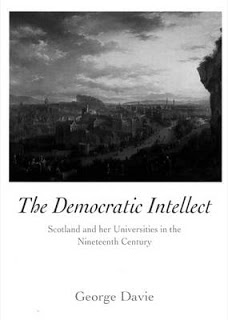
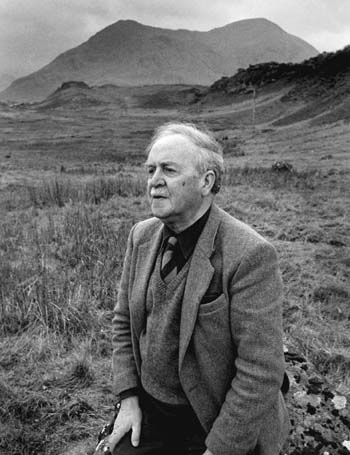
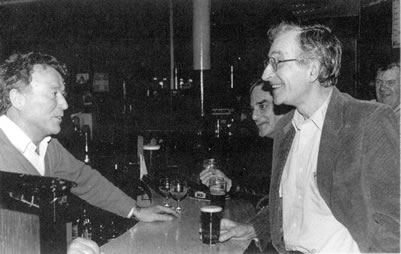
Thank you for this appreciation of George Davie and his work. George Elder Davie was a very kind man. He was my tutor during my last term at Edinburgh University in 1975. During that term my wife had a baby (planned for then). There were complications, and she became very ill. She remained in Elsie Inglis Hospital for several weeks. I was quite distracted from hat was my studies and missed several tutorials. Dr. Davie was incredibly kind and understanding. When I was able to return to concentrating on my studies in preparation for Philosophy Honours finals, Dr Davies was determined that I should do o.k. in the finals. He more than made up in tutorials for the time I had lost, and took an interest in me as a person, more than a student. I have a copy of The Democratic Intellect that he signed. I was very interested in the Dutch Reformed tradition of the Worldview and philosophical framework of knowledge. It seemed to me that Dr. Davie’s concern for generalist and liberal arts education had a similar concern to the Dutch school of Abraham Kuyper, though Kuyper was much more concerned with the religious basis of worldview and generalism. Dr. Davies called himself a “good lapsed Presbyterian”.
Our cultures entrenched devotion to specialization is I think a real problem for humanity in general. I have been in the company of those in the neurosciences who continually repeat the term “Folk Psychology” like erudite parrots, applied as it is to anything not reducible to the increasingly esoteric scientific jargon of their professions. This is something that causes considerable irritation, and tends to create the impression that specialists are arrogant and out of touch with the “everyday”- with the problematic world of everyday people viewed with disdain by many of these experts in comparison to the exalted minutiae of technical details.
There seems to be an overweening pressure to reduce all human endeavour to conveniently simple elementary forces that somehow solve the ‘problems’ of the complex human condition. Folk Psychology is a term applied to the insights of literary geniuses, novelists, philosophers, creative thinkers and any alternative sources outside the narrow fields of the scientific specializations. The misappropriation of the term is used as a weapon against alternative and often deeper forms of knowledge habitually dismissed as “laymen describing everyday life”, with ‘everyday’ uttered pejoratively in opposition to the ‘scientific method’. We all know the limitations of the hysterically reified scientific method, as was lucidly clarified by Thomas Kuhn, in his emphasis of subjectivity of competing paradigms ( and to be clear Kuhn was no subjective relativist)- and that is before we consider the epistemological implications of Heisenberg’s Uncertainty Principle, Bohr’s Principle of Complementarity, Schrodinger’s famous Thought-Experiment, or the wider problems of a technologically dependent highly specialized science in economics terms and the limits financial reality will place on such practice.
Modern specialists would be wise to remember the debt payed by the great minds of science on so-called folk psychology. Much of course has been made of Einstein’s debt to Mach and to the intellectual giant of James Clerk Maxwell, but Einstein was as inspired, if not more so, by reading David Hume. Schrodinger drew inspiration from Schopenhauer. Niels Bohr was obsessed with Kierkegaard. I have been in the company of specialists who have never read Wittgenstein, Heidegger or Dewey, three of the great giants of 20th Century human thought.; they dismiss such folk psychology as primitivism of some kind that will inevitably be superseded by discoveries made by the scientific method: art, religion, poetry, literature are all debunked with Spenglerian obsolescence. Modern scientific specialization is a form of intellectual imperialism. How can those who can predict peoples behaviour more accurately and with reliable predictability than so-called experts be dismissed so casually?
The problem is when we have experts of all kinds, knowledgeable in very narrow range of human experience, and yet very often merely ignorant pedants pontificating their toxic opinions, on subjects as wide ranging as government policy or moral conundrums they are unqualified to answer. As Nicholas Murray Butler said: “An expert is one who knows more and more about less and less”- this in itself may lead to a more barbarous humanity with little concern for the more refined forms of thought adhered to in the humanities- will we for example lose a more rigorous capacity for critical thinking without the historical perspective of philosophical engagement? A barbarian with a neolithic axe in his hand or a laser weapon is still a barbarian- its the territoriality, agression and unregulated primitive behaviour that is the ‘problem’.
Yep, and it’s entrenched in our universities now. There is far more funding available for research in the sciences, and as a consequence mediocre science researchers are given far more money than excellent counterparts in the humanities to pursue what is ultimately supposed to be the same level of study. It’s not unusual for a bog-standard engineering graduate with a 2:1 or a 2:2 to get given twenty thousand pounds a year to pursue doctoral research, while across campus a brilliant young historian with a first-class honours degree and a distinction at masters level is told she has to do it for free. It’s become a two-tier system justified by market ideology.
The obsession with specialisation, rote learning, endless testing, and endless quantification fits well with the needs of the corporate system for a compliant, amoral, technical/management elite. The idea of connecting the sciences to a broader moral purpose, or subordinating intellectual attainment to human values is anathema. You can’t have cluster bombs, depleted uranium or even a corporate controlled political system if you dispense with the current, ugly arrangements.
Bertrand Russell’s definition of the core purpose of education – the process of ‘instilling other values than domination’ still stands.